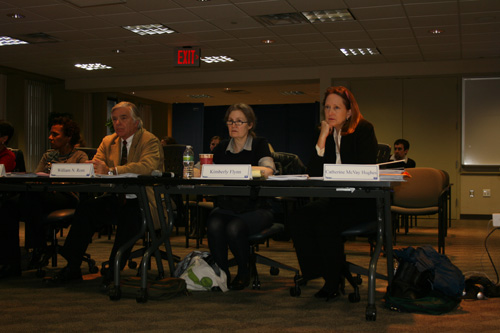
BY ALINE REYNOLDS | It’s difficult to assess measures of exposure to the toxins resulting from 9/11 when much of the necessary supporting scientific evidence was never recorded.
That’s what members of the Scientific Technical Advisory Committee (S.T.A.C.) panel discovered after reviewing data concerning the link between the cancer and 9/11. Months passed following the 9/11 attacks when first responders and the general public were told the air was safe to breathe, and some believe it was that time period when much of the scientific data was lost.
The lack of information, however, didn’t deter the S.T.A.C. from unanimously agreeing that certain forms of cancer should be added to the James L. Zadroga 9/11 Health and Compensation Act. The government-appointed scientific advisory panel convened for a two-day conference Wednesday, Feb. 15 and Thursday, Feb. 16 at the Jacob K. Javits Federal Building in Lower Manhattan to brainstorm ideas for a formal recommendation on the matter to submit to the National Institute for Occupational Safety and Health (N.I.O.S.H.) by April.
After hours of presentations, testimonies, and discussion, the S.T.A.C. decided Wednesday afternoon that victims with lung and other select types of cancer should be eligible for treatment under the Zadroga Act.
“The public really made a compelling argument for why it’s important in their view for us to act on it, even though we don’t have all the evidence we’d like to have to make a scientific determination,” said S.T.A.C. Chair Elizabeth Ward.
Community Board 1 Vice Chairperson Catherine McVay Hughes, and a S.T.A.C. member, said that based on the presented material, she became convinced that the development of blood cancer and lymphoma in addition to lung cancer is tied to the exposure to Ground Zero carcinogens.
“The panel was right to finally conclude that cancer could be an outcome of W.T.C. exposure,” said Hughes. “This is a very important step in the right direction.”
Ward and a few other S.T.A.C. members will draft a written recommendation that the committee as a whole will finalize at a forthcoming meeting.
The committee has until Monday, April 2 to submit the final version of the recommendation to N.I.O.S.H. Director John Howard, the bill’s health program administrator. The original deadline was Friday, March 2, however Howard agreed this week to grant the committee a 30-day extension.
Howard will then have 60 days to decide whether or not to endorse the committee’s recommendation and modify the bill accordingly.


































